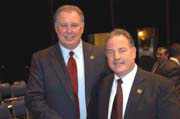What happens if the state of New Jersey institutes a millionaire’s tax?
Millionaires, according to the freshman state Assemblyman Lou Manzo, who represents lower Jersey City and Bayonne, will flee to neighboring states where no such tax exists.
Manzo is touring the state with what he believes is a better idea for providing sorely needed revenues to meet the state Supreme Court’s mandate for a fair formula for funding public schools.
Under a bill submitted by Manzo and supported by several other Hudson County legislators called the SMART Bill, the state would simply shift the source of school funding from municipal property taxes – which the Supreme Court has claimed are an unconstitutional means of funding schools – to income taxes.
While this seems a little like taking money from one pocket and putting it into another, Manzo said the legislation will actually bring in enough revenue to support the schools and still give many taxpayers a 50 percent decrease in their yearly municipal school tax bill.
The main focus of the SMART Bill, he said, is to advance and promote the removal of school taxes from local property tax – which Manzo called a regressive tax. About $15 billion in property taxes are collected in the state each year, accounting for about 45 percent of all state and local taxes. This is significantly higher than the national average, which is 31 percent. Over the last decade, property tax levies have increased on the average of $500 million per year.
The millionaire tax would increase state income taxes for the wealthiest New Jersey residents to close the state budget gap. It has been proposed in legislative committee.
State responsibility
Although local municipal and county governments use property taxes to raise operating revenues, the state constitution says education is the responsibility of the state. In continued rulings issued since the early 1970s, the State Supreme Court has ruled that basing school funding on property taxes is unconstitutional. One reason for the state’s establishing of an income tax in the late 1970s was to address the school funding problem. Yet rather put the funding wholly in the purview of income tax, the state developed a complicated rebate program that Manzo said many people do not understand.
While Manzo’s bill would not do away with the rebate program upon which many senior citizens depend for yearly tax relief, his bill would establish an additional rebate program, one that would refund to property owners 90 percent of all homestead public school property taxes
“My bill would shift the burden from property taxpayers,” Manzo said. “Senior citizens would have a choice to accept the home rebate or the new rebate, depending on which is higher.”
Instead, the bill would establish an income tax surcharge dedicated to paying for schools throughout the state. Like the millionaire’s tax, this surcharge would be focused on some of the highest wage earners in the state, exempting most of the state’s population. Based on current income data, 2.5 million residents of New Jersey would be exempt, leaving 200,000 to pay the bill.
Manzo argued, however, that this did not discriminate, since the sales and income tax structure currently forces the working poor to pay about 7 percent in various statewide taxes, while the middle income people pay about 4.8 percent and the wealthiest pay about 1 percent. Under his legislation, all income levels would pay about 4 percent. In addition to this, he said, the poorest to the wealthiest would each receive the same 90 percent reduction in property taxes, greatly offsetting the effects of the surcharge.
Unlike the millionaire tax that is also under consideration by the state Assembly, Manzo said his bill would not chase the wealthy out of the state, noting that even with the surcharge, the income tax rate in New Jersey would be significantly lower than income tax in surrounding states. Manzo also noted that money from other revenues could be used to help reduce the surcharge.
Based on the most available income statistics, Manzo estimated his bill would bring in about $4.3 billion to cover the costs of providing the public education throughout the state and the property refunds would average about $1,500 to more than 90 percent of homeowners throughout the state.
“Given the available options to provide relief for the state’s overburdened property taxpayers, this series of proposals will be for [long-awaited relief] for by New Jersey’s residents,” he said.
A rookie assemblyman, Manzo said property tax relief was one of his biggest issues in running for the state Assembly, and that he had originally intended to support a tax on millionaires.
“But I agree that it might cause many of our wealthier citizens to leave the state,” he said.
In looking around for alternatives, he said he came across this proposal that was generated out of the New Jersey Coalition for Property Tax Reform.
“I felt it was a good proposal,” he said.
Manzo, in fact, thinks so highly of the program, that he has begun a statewide campaign to help get the public behind it.
“I’m visiting senior centers and other groups with the hopes that people will go to their legislators and ask them to support the bill,” said Manzo, who is also reaching out to other Hudson County Assembly members to get support. So far, he has received good responses from his fellow 31st District Assemblyman Anthony Chiappone and from Union City Mayor and 33rd District Assemblyman Brian Stack.
